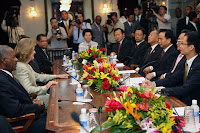ISRAEL
The history of Israel is very closed with the religion and the biblical background where Israel and the Palestinian territories comprise the major part of the Holy Land, a region of significant importance to all Abrahamic religions: Jews, christians, Muslims and Baha'is; because Abraham promised this land to his inheritors.
It is also important to these religions because Jerusalem is the place where some important places for religion are located, such as the western wall and church of the holy sepulcre.
Other important cities are Nazareth (for Christians), Tiberias and Safed (two of the four holy cities for Judaism) and so on.
This country has two official languages, Hebrew is the primary language of the state and is spoken by the majority of the population, and Arabic is spoken by the Arab minority.
Another characteristic of this country that evidences its religious influence is the kosher food, which is food prepared in accordance with the Jewish dietary law; because there are some animals forbidden to eat and others that must be slaughtered in a specific way to be considered Kosher.
Finally, a kibbutz is an agricultural Israeli commune characterized by the collective property, agricultural work; own work (owners of means of production and their own workforce), democratic decisions, Judaism and rotation of positions.
CANADA
This is a diversified country, with two official languages French and English and where most of the population is old and is the reason they are receiving young immigrants which bring more diversification to its culture.
In the organizational culture we can find they tend to create an energized and spirited workforce while at the same time valuing diversity and ethics. The organizational culture is their firm structure to build competitive advantage.
Organizational behavior: giving importance to the employee as an individual, groups and the organization as a whole.
It is important the employee motivation and perception of the organization; the employee receive motivation through different instruments stipulated by laws and organizations like labor laws, institutions and labor unions.
In groups leadership and good communication is a characteristic, jobs are specially designed to achieve continuous improvement and enjoy work, regarding culture companies try to align culture and build a corporate culture.
Within the organization due to the cultural difference in the country there are cultural changes to adapt employees to the corporate culture. The organization is composed by a mix of human capital, leadership (the company invest in creating leaders), diversity management ( due to age, gender, racial and ethnic diversity) and constant change to improve constantly.
BRAZIL
Management and communication style, and business structure:
subordinates do just what they are told to, so instructions must be clear and precise for them.
The organizations structures are hierarchical, the boss give precise instructions to subordinates, and in the same way decisions are made just by the top. The respect to the superior and the power of it depends on its personality and the relationship with it.
When doing business with brazil be aware of your sense of humor and of speaking Spanish, it will be seen as offensive. For Brazilians when doing business they prefer the oral than the written and when talking they use a lot of body language it could be exaggerated.
RUSSIA
Before talking about Russian business style and organization is important to take into account its history. Russia was part of the USSR and since its dissolution it has been living a lot of changes even today.
Today things are changing in a day top day basis so things are not true in every region. Another consequence of the Russian history is that citizens see the government as their enemy and they think laws are to be broken, so be aware when doing business with them, contracts are not important and has no force for them, they prefer to talk and make agreements in meetings where contracts and papers are not necessary; so to be sure of your agreements is necessary to build a good relationship with the correct person in the company.
The hierarchy in Russian companies is well marked, the correct person to do business with is the one in the top because is the one who make decisions and subordinates has no influence, they just follow instructions.















